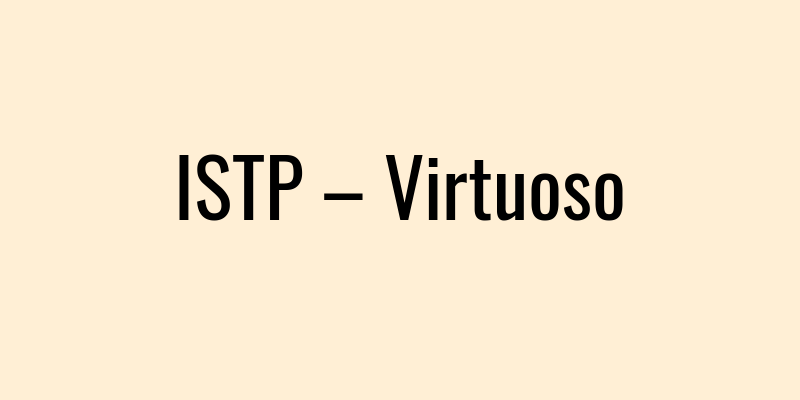Understanding the Myers-Briggs Type: ISTP
Exploring the Pros and Cons of the ISTP Personality
The Myers-Briggs Type Indicator (MBTI) is a widely used personality assessment that categorizes individuals into 16 different personality types. The ISTP personality type, also known as the Virtuoso, is one of these 16 types. People with the ISTP personality are known for their adventurous, hands-on approach to life and their ability to stay calm under pressure. However, like any personality type, ISTPs have their own set of strengths and weaknesses. In this article, we will explore the advantages and disadvantages of being an ISTP, shedding light on the unique characteristics and potential challenges of this personality type.
Before diving into the pros and cons of the ISTP personality type, it's important to understand that the MBTI is just one of many tools for understanding personality and behavior. While it can provide valuable insights, it's essential to remember that individuals are complex and can exhibit traits from multiple personality types. With that in mind, let's take a closer look at the advantages and disadvantages of the ISTP personality.
Pros
ISTPs possess a range of positive qualities that contribute to their effectiveness and adaptability in various situations. From their practical mindset to their ability to thrive in high-pressure environments, here are some notable advantages of the ISTP personality type:
Adaptable and Versatile
ISTPs are known for their adaptability and versatility, making them adept at navigating different scenarios and challenges. They are quick to analyze situations and make practical, effective decisions, allowing them to thrive in diverse environments.
Practical and Hands-On
With a preference for hands-on learning and practical problem-solving, ISTPs excel in tasks that require a keen eye for detail and a pragmatic approach. Their ability to troubleshoot and find straightforward solutions is a valuable asset in various fields, from engineering to creative endeavors.
Calm Under Pressure
Even in high-stakes situations, ISTPs display a remarkable level of composure and a capacity to think rationally. This ability to stay calm under pressure allows them to make well-reasoned decisions and take decisive action when others may feel overwhelmed.
Independent and Self-Sufficient
ISTPs value their independence and autonomy, often thriving in roles that allow them to work autonomously. Their self-sufficiency enables them to tackle challenges with resourcefulness and determination, making them reliable and self-reliant individuals.
Analytical Decision-Making
ISTPs are skilled in analyzing complex situations and making practical, logical decisions. Their ability to remain calm and rational under pressure allows them to effectively assess various options and choose the most suitable course of action.
Resourcefulness
ISTPs are highly resourceful individuals who excel in finding innovative solutions to problems. Their hands-on approach and keen sense of practicality enable them to adapt to changing circumstances and utilize available resources efficiently.
Missing a pro?
Let us know which pro you are missing!
Cons
While ISTPs offer valuable strengths, there are also potential drawbacks associated with this personality type. It's important to recognize the challenges that ISTPs may face in certain aspects of life. Here are some of the disadvantages of the ISTP personality:
Risk of Underestimating Emotional Needs
Due to their pragmatic and logical nature, ISTPs may inadvertently overlook the emotional aspects of their own well-being and that of others. This tendency can lead to challenges in interpersonal relationships and a need for greater awareness of emotional dynamics.
Resistance to Structure and Routine
ISTPs often prefer flexibility and spontaneity over rigid structures and repetitive routines. While this inclination allows for adaptability, it can also pose challenges in environments that demand strict adherence to schedules and protocols, leading to potential conflicts.
Risk-Taking Tendencies
The ISTP's adventurous and thrill-seeking nature can sometimes lead them to engage in risky behaviors or make impulsive decisions. This inclination towards risk-taking can present hazards in certain contexts, necessitating a careful balance between spontaneity and prudent judgment.
Reserved Communication Style
ISTPs may struggle with expressing their emotions and thoughts openly, often preferring to maintain a reserved communication style. This inclination can create barriers in personal and professional relationships, requiring conscious efforts to engage more openly with others.
Potential Risk-Taking Behavior
ISTPs' inclination towards risk-taking and thrill-seeking activities can sometimes lead to impulsive decision-making and disregard for potential consequences. This tendency may expose them to unnecessary risks in certain situations.
Difficulty Expressing Emotions
ISTPs may struggle with expressing their emotions openly, which could lead to misunderstandings in personal and professional relationships. Their reserved communication style may hinder effective emotional expression and connection with others.
Missing a con?
Let us know which con you are missing!
Conclusion
In conclusion, the ISTP personality type encompasses a distinctive blend of strengths and challenges, offering valuable characteristics while also posing potential obstacles. By embracing self-awareness and understanding the dynamics of their personality, ISTPs can leverage their strengths and work towards overcoming the associated drawbacks. Recognizing the multifaceted nature of the ISTP type enables individuals to navigate their personal and professional lives with a nuanced understanding of their unique traits.
What do you think?
Do you think the pros outweigh the cons?







